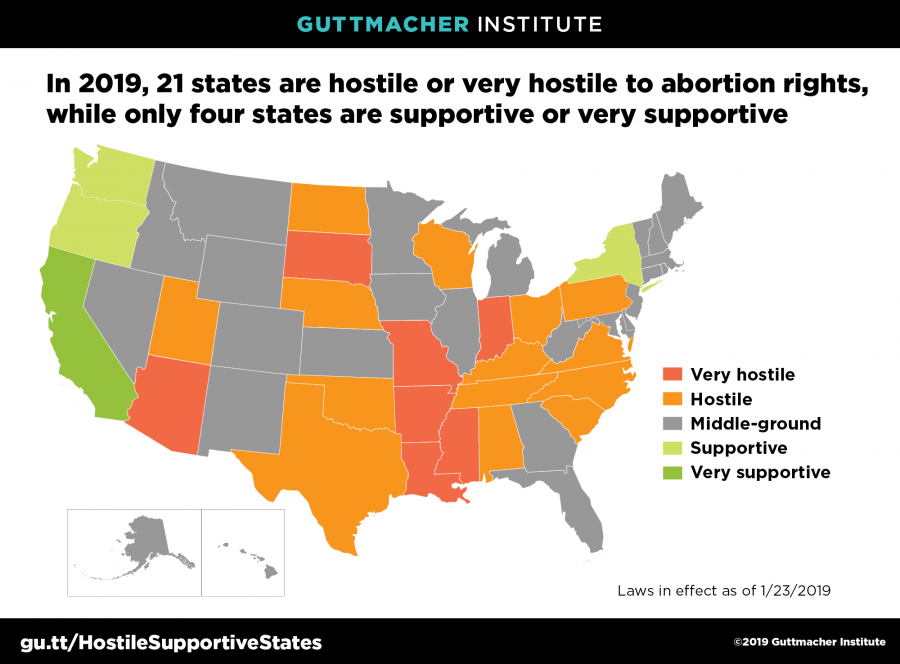
The first 100 days of 2019 have included unprecedented efforts by states throughout the U.S. to ban or restrict reproductive rights.
While the overall number of anti-abortion legislation introduced in U.S. states thus far in 2019 is essentially the same as in 2018, the nature of this year’s bills is more harmful and restrictive than anything we’ve seen in recent history.
Prior to this year, the primary state-level attacks came in the form of targeted regulation of abortion providers (TRAP) laws. Though often disguised as regulations to ensure patient safety, TRAP laws are actually onerous restrictions that create barriers to obtaining health care and limit access to abortion services. Some of the most common forms of TRAP laws, such as mandating abortion providers have admitting privileges at a nearby hospital or that abortion facilities meet the same medical standards for ambulatory surgical centers, even if they are only providing medication abortion, have already been struck down as unconstitutional by the courts, as was the case in the groundbreaking Supreme Court decision Whole Women’s Health v. Hellerstedt in 2016.
In 2019, however, some state legislatures aren’t even attempting to hide their motives with a false assurance of caring about patient safety. This year, we are witnessing a wave of state legislation aimed at outright banning abortion once a fetal heartbeat is detected, which can be as early as six weeks’ gestation. At this point in the pregnancy, the fetus is not viable, and many people wouldn’t even suspect they are pregnant.
This isn’t the first year ‘fetal heartbeat laws’ have made an appearance on a legislative docket. Ohio first introduced a bill to ban abortion after the detection of a heartbeat in 2011, though the bill was twice vetoed by former Governor John Kasich and never enacted. In 2013, North Dakota became the first state to pass a fetal heartbeat law, and Iowa enacted a similar six-week ban in 2018.
2019 seems to be a turning point in anti-choice legislation. This past March, Mississippi and Kentucky governors signed bills into law, and Ohio just became the fifth state overall, and the third in 2019 alone, to enact such a ban. Fortunately, each of these laws are temporarily blocked by the courts and are in the midst of a lengthy litigation process.
And yet, the fact that these regressive policies were able to pass in the first place sets a dangerous precedent for the rest of the country. Unfortunately, many other states are not far behind:
Heartbeat legislation has already cleared both chambers of the Georgia General Assembly and is merely waiting to be signed into law.
Six-week bans have also been filed or are actively pending in one or both chambers of state legislatures in Florida, Illinois, Louisiana, Maryland, Minnesota, Missouri, South Carolina, Tennessee, and West Virginia, just to name a few.
In addition to heartbeat bans, we are witnessing a surge in other forms of draconian legislation that criminalizes abortion:
Texas’ HB 896, for example, would make abortion a capital murder offense for both the patient and provider, “regardless of any contrary federal law, executive order, or court decision.” Despite the seemingly obvious hypocrisy of a bill that carries the possibility of the death penalty as punishment, HB 896 currently sits in the Texas House Judiciary and Civil Jurisprudence Committee awaiting further action.
Six states, Arkansas, Kentucky, Louisiana, Mississippi, North Dakota, and South Dakota, have successfully passed ‘trigger laws’ that would criminalize abortion if Roe v. Wade were to be overturned or heavily gutted. Eight other states have introduced similar bills this legislative session that are contingent on Roe’s demise.
Though the specific language found in each of these bills may vary, the rationale is the same. State legislators know their proposals are unconstitutional. The rights at stake extend beyond solely restricting abortion access in select states.
By systematically criminalizing abortion on a state-by-state level, anti-choice activists and legislators are placing bets that each of these bills will be tested in the court system, with the hopes of sparking lawsuits that will work their way up to the Supreme Court. With the elevation of Justice Kavanaugh to replace Justice Kennedy on the Supreme Court, activists fear the door is left open to erode, undermine, and ultimately repeal some of the core principles established by Roe v. Wade in 1973.
Bleak as it may appear, legislators in other states, including Rhode Island, Vermont, New York, and Kansas have spent the past four months pursuing legislation that protects reproductive choice by repealing existing restrictions or affirming state-wide abortion access even if the federal laws in place were to fall.
In a world where religion is often pitted against reproductive choice, we must remain steadfast in our commitment to both. We trust individuals to make their own reproductive health care decisions, and we firmly believe that bodily autonomy is a necessity in a democratic society. Together, we can act to ensure that reproductive rights become a priority today, tomorrow, and for future generations:
- Take action with us by urging your members of Congress to co-sponsor and pass the EACH Woman Act, which would ensure that an individual’s access to abortion services is not dependent on their health insurance nor their income.
- Research reproductive rights laws in your state. Our partners at Planned Parenthood, NARAL Pro-Choice America and the American Civil Liberties Union (ACLU) have incredible resources to examine the current policies and pending legislation in your state.
- Schedule a meeting with your local legislators. Too often, we forget that elected officials work for us. If you are passionate about reproductive rights, schedule a meeting with your officials and explain why you care about reproductive freedom.
Ally Karpel is the WRJ Religious Action Center Eisendrath Legislative Assistant.
Related Posts

Continuing to Educate and Empower People Together

My Challah-Making Experience


